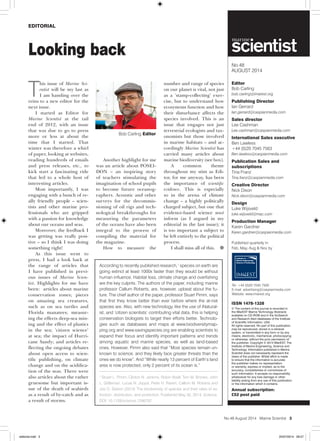More Related Content
Similar to MarSci Aug 2014 p3 EDITORIAL Looking back
Similar to MarSci Aug 2014 p3 EDITORIAL Looking back (20)
More from Bob Carling (6)
MarSci Aug 2014 p3 EDITORIAL Looking back
- 1. No.48 August 2014 Marine Scientist 3
T
his issue of Marine Sci-
entist will be my last as
I am handing over the
reins to a new editor for the
next issue.
I started as Editor for
Marine Scientist at the tail
end of 2012, with an issue
that was due to go to press
more or less at about the
time that I started. That
winter was therefore a whirl
of paper, looking at websites,
reading hundreds of emails
and press releases, etc., to
kick start a fascinating ride
that led to a whole host of
interesting articles.
Most importantly, I was
engaging with a bunch of re-
ally friendly people – scien-
tists and other marine pro-
fessionals who are gripped
with a passion for knowledge
about our oceans and seas.
Moreover, the feedback I
was getting was really posi-
tive – so I think I was doing
something right!
As this issue went to
press, I had a look back at
the range of articles that
I have published in previ-
ous issues of Marine Scien-
tist. Highlights for me have
been: articles about marine
conservation zones; pieces
on amazing sea creatures,
such as on sea turtles and
Florida manatees; measur-
ing the effects deep-sea min-
ing and the effect of plastics
in the sea; ‘citizen science’
at sea; the impact of Hurri-
cane Sandy; and articles re-
flecting the ongoing debates
about open access to scien-
tific publishing, on climate
change and on the acidifica-
tion of the seas. There were
also articles about the rather
gruesome but important is-
sue of the death of seabirds
as a result of by-catch and as
a result of storms.
Looking back
Another highlight for me
was an article about POSEI-
DON – an inspiring story
of teachers stimulating the
imagination of school pupils
to become future oceanog-
raphers. Acoustic and other
surveys for the decommis-
sioning of oil rigs and tech-
nological breakthroughs for
measuring the parameters
of the oceans have also been
integral to the process of
compiling the material for
the magazine.
How to measure the
number and range of species
on our planet is vital, not just
as a ‘stamp-collecting’ exer-
cise, but to understand how
ecosystems function and how
their disturbance affects the
species involved. This is an
issue that engages not just
terrestrial ecologists and tax-
onomists but those involved
in marine habitats – and ac-
cordingly Marine Scientist has
carried many articles about
marine biodiversity (see box).
A common theme
throughout my stint as Edi-
tor, for me anyway, has been
the importance of scientific
evidence. This is especially
so in the arena of climate
change – a highly politically
charged subject, but one that
evidence-based science must
inform (as I argued in my
editorial in the last issue); it
is too important a subject to
be left entirely to the political
process.
I shall miss all of this.
ISSN 1478-1328
© The content of this journal is recorded in
the IMarEST Marine Technology Abstracts
available on CD-ROM and in the SciSearch
and Research Alert databases of the Institute
of Scientific Information, USA
All rights reserved. No part of this publication
may be reproduced, stored in a retrieval
system, or transmitted in any form or by any
means, electronic, mechanical, photocopying
or otherwise, without the prior permission of
the publisher. Copyright © 2014 IMarEST, The
Institute of Marine Engineering, Science and
Technology. Information published in Marine
Scientist does not necessarily represent the
views of the publisher. Whilst effort is made
to ensure that the information is accurate
the publisher makes no representation
or warranty, express or implied, as to the
accuracy, completeness or correctness of
such information. It accepts no responsibility
whatsoever for any loss damage or other
liability arising from any use of this publication
or the information which it contains.
Annual subscription:
£52 post paid
Bob Carling Editor
EDITORIAL
Editor
Bob Carling
bob.carling@imarest.org
Publishing Director
Ian Gerrard
Ian.gerrard@caspianmedia.com
Sales director
Lee Cashman
Lee.cashman@caspianmedia.com
International Sales executive
Ben Lawless
+44 (0)20 7045 7563
Ben.lawless@caspianmedia.com
Publication Sales and
subscriptions
Tina Franz
Tina.franz@caspianmedia.com
Creative Director
Nick Dixon
Nick.dixon@caspianmedia.com
Design
Luke Wijsveld
luke.wijsveld@mac.com
Production Manager
Karen Gardner
Karen.gardner@caspianmedia.com
Published quarterly in
Feb, May, Aug & Nov by
No.48
AUGUST 2014
According to recently published research,1
species on earth are
going extinct at least 1000x faster than they would be without
human influence. Habitat loss, climate change and overfishing
are the key culprits. The authors of the paper, including marine
professor Callum Roberts, are, however, upbeat about the fu-
ture. The chief author of the paper, professor Stuart Pimm, says
that first they know better than ever before where the at-risk
species are. Also, with new technology, like the use of iNatural-
ist, and ‘citizen scientists’ contributing vital data, this is helping
conservation biologists to target their efforts better. Technolo-
gies such as databases and maps at www.biodiversitymap-
ping.org and www.savingspecies.org are enabling scientists to
expand their focus and identify important patterns and trends
among aquatic and marine species, as well as land-based
ones. However, Pimm also said that “Most species remain un-
known to science, and they likely face greater threats than the
ones we do know”. And “While nearly 13 percent of Earth’s land
area is now protected, only 2 percent of its ocean is.”
1
Stuart L. Pimm, Clinton N. Jenkins, Robin Abell, Tom M. Brooks, John
L. Gittleman, Lucas N. Joppa, Peter H. Raven, Callum M. Roberts and
Joe O. Sexton (2014) The biodiversity of species and their rates of ex-
tinction, distribution, and protection. Published May 30, 2014, Science.
DOI: 10.1126/science.1246752
Tel: +44 (0)20 7045 7500
E-mail: advertising@caspianmedia.com
Website: www.imarest.org
editorial.indd 3 25/07/2014 09:57

